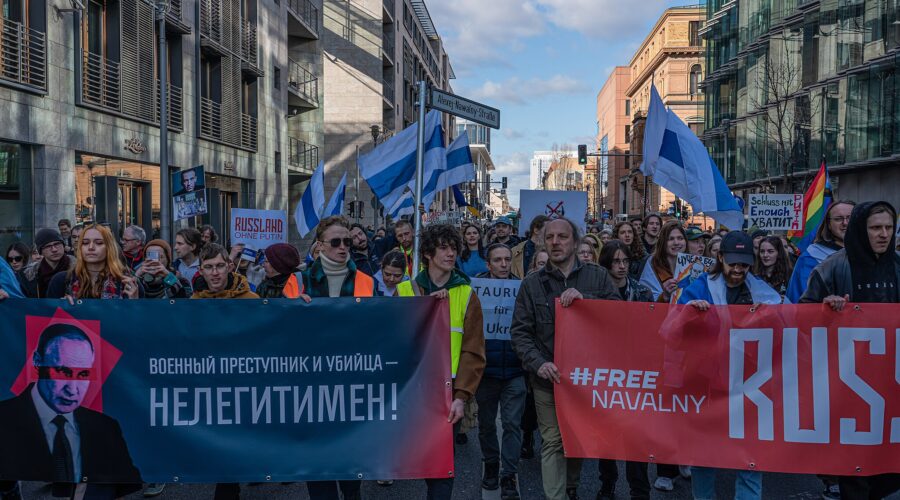After successfully eliminating any potential opponents, Russian leader Vladimir Putin won the presidential election with ease. Now that he has secured his sixth term in the Kremlin, the former KGB apparatchik can claim to have a popular mandate to continue his war on Ukraine, regardless of the series of humiliations Moscow has suffered over the past two years.
Russian officials, as well as pro-Kremlin propaganda, insist that the whole nation has united around Vladimir Putin. Even in the Russian Belgorod and Kursk regions – where people have learned to live under constant artillery shelling, missile, and drone attacks – Putin reportedly got between 88 and 90 percent of the vote.
Although elections in Russia can hardly be described as free and fair, relatively independent opinion polls suggest that Putin really enjoys significant support from the vast majority of the Russian citizens. Despite the fact that the Kremlin cannot guarantee the Russian population a very basic thing – security – most voters in Russia do not seem to blame Putin for catastrophic failures of his Ukraine adventure.
In Belgorod, voters reportedly had to evacuate to bomb shelters, as the authorities proved unable, or unwilling, to protect the region from the Ukrainian attacks. But for Russian officials and pro-Kremlin analysts, what’s happening in Russia’s border regions is not Putin’s fault, while “the great leader” publicly praises the “bravery of the people of Belgorod.”
“The primary task is to ensure safety. There are different ways to do this. They are not easy, but we will do it”, Putin stressed on March 20.
Indeed, there are several options for ensuring safety in Belgorod and Kursk. One is to immediately withdraw his troops from Ukraine and end the war, which is what Putin will almost certainly not do. At least in the near future. Alternatively, he can mobilize additional hundreds of thousands – if not millions – of men and attempt to seize Ukraine’s eastern regions bordering Russia. Given that the Kremlin repeatedly refuses to take such an action, it is improbable that Putin will decide to raise the stakes to protect Russian territory.
Therefore, the most realistic course of action is the status quo, where residents of Belgorod, Kursk, as well as other Russian cities, towns, and regions, will have to adapt to a new reality. They will have to learn to live the same way as citizens of Donetsk, Kharkiv, and many other places in Ukraine. Life under the bombs seems to have become a “new normalcy” for Russian western oblasts, and that’s the result of Putin’s so-called special military operation.
The Russian leader could, hypothetically, offer to make some concessions to Kyiv and the West, hoping that Ukraine would make a “goodwill gesture” in return, and stop attacking Russian territory. But given the current war dynamics, and the fact that Ukraine proved it has the capacity to launch drone and missile strikes deep into Russia and destroy the country’s energy and military infrastructure, at this stage of the conflict a Western-backed Kyiv is unlikely to make any deals with Putin.
Instead, Ukraine is expected to intensify its attacks on the Russian Federation, while pro-Kremlin propaganda will try to hide the fact that “the second-best military in the world” cannot protect its own territory, and that Moscow cannot count on its allies’ assistance.
According to Article 4 of the Collective Security Treaty Organization (CSTO) Treaty, “an act of aggression (an armed attack that threatens security, stability, territorial integrity, and sovereignty) against one of the member states will be considered as a collective act of aggression on all member states of the CSTO”. Since not a single CSTO member – Belarus, Kazakhstan Kyrgyzstan, Tajikistan, and Armenia – has ever reacted to Ukrainian attacks on Belgorod, it became quite clear that Russia, as a de facto leader of the CSTO, is on its own, and that the military bloc exists merely on paper. And that is another result of Putin’s “special military operation”.
But most Russian voters seem to have rewarded such a policy from Putin. There are, however, many Russians who oppose his rule. According to reports, on March 17 at noon, thousands of people turned up at polling stations not only in Russia, but in capitals across the world as well, to take part in a symbolic protest against the re-election of Vladimir Putin.
Even though a large number of Russians might have really voted “for any candidate but Putin”, that did not have an impact on the election result. As Joseph Stalin reportedly once said: “Those who count the vote decide everything”. In Putin’s Russia, the authorities have developed a “perfect election system”, and they proudly claim that Russian democracy is “the best in the world”. It is, therefore, no surprise that Putin won 87 percent of the vote, and that he became the longest-serving Russian leader since Stalin.
As Kremlin spokesman Dmitry Peskov reportedly said, Russian presidential elections are “not really democracy, it is costly bureaucracy.” Putin, as an experienced bureaucrat, will continue balancing the interests of various oligarchic factions within the Kremlin, for at least six more years. Unless he dies in the meantime.
Image: “Noon against Putin” event in Berlin on 17 March, 2024 by A.Savin, Wikipedia

